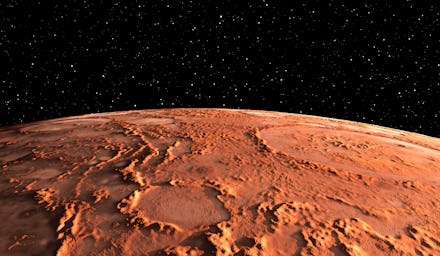NASA just recorded quakes on Mars for the first time

There's a lot scientists don't know about Mars, the little red planet next door. Now, new reports are suggesting that Mars is a lot more active than you might think. A NASA mission recorded quakes on Mars for the first time along with another interesting surprise.
In November 2018, NASA's InSight lander touched down on Mars after a 205-day journey. Outfitted with an array of equipment to measure Mars' "vital signs", the spacecraft's landing marked the beginning of the first mission exploring Mars' deep interior.
It's taken some time but NASA published its first findings from the mission in the journals Nature Geoscience and Nature Communications. The papers only capture the first 10 months but, in that time, InSight made an interesting discovery: Mars is shaking.
The spacecraft picked up on 174 quakes that were reported in the studies. However, Bruce Banerdt, InSight's principal investigator, told Business Insider that the spacecraft has continued to record quakes. Now, there are over 450 documented quakes within its catalogue.
"We've finally for the first time established that Mars is a seismically active planet," Banerdt said, according to Business Insider. "It's probably close to the kinds of seismic activity you would expect to find away from the plate boundaries on earth."
To measure the quakes, scientists have to use the Richter scale, which was developed for quakes on Earth. Of the Mars quakes reported, only 24 were above a 3 in magnitude, which is considered weak, and none of them went past a 4.
Under Earth's conditions, the Los Angles Times reported that an earthquake coming in at a magnitude of 3 would be "felt quite noticeably by persons indoors" but "many people do not recognize it as an earthquake." However, quakes on Mars are occurring under vastly different conditions.
To start, Mars doesn't have tectonic plates like Earth. Shifting tectonic plates can trigger earthquakes here but in Mars, these quakes occur because of long-term cooling of the planet and other processes, CNN reported.
In addition, the quakes on Mars are taking place way deeper in the surface. Suzanne Smrekar, InSight's deputy principal investigator told CNN that if you were standing directly over a quakes on Mar, you might feel it, but there would be no damage.
If the quakes weren't cool enough, InSight picked up something else: humming. Yep, Mars is singing to itself, with InSight picking up the signal in the background of its quakes. It's similar to a mysterious hum on Earth traced back to an underwater volcano, but nobody is quite sure yet why Mars is humming.